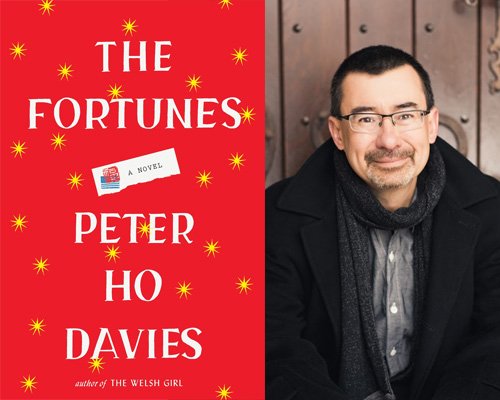A Review of Peter Ho Davies’s The Fortunes (Houghton Mifflin, 2016).
By Stephen Hong Sohn

This publication was one of my biggest anticipated reads for 2016, as Peter Ho Davies’s third work, The Welsh Girl, was one of my faves. Davies is also author of two wonderful short story collections (The Ugliest House in the World and Equal Love). Here is a short summary from B&N: “Sly, funny, intelligent, and artfully structured, The Fortunes recasts American history through the lives of Chinese Americans and reimagines the multigenerational novel through the fractures of immigrant family experience. Inhabiting four lives—a railroad baron’s valet who unwittingly ignites an explosion in Chinese labor; Hollywood’s first Chinese movie star; a hate-crime victim whose death mobilizes the Asian American community; and a biracial writer visiting China for an adoption—this novel captures and capsizes over a century of our history, showing that even as family bonds are denied and broken, a community can survive—as much through love as blood. Building fact into fiction, spinning fiction around fact, Davies uses each of these stories—three inspired by real historical characters—to examine the process of becoming not only Chinese American, but American.”
As I relayed my reading experience to my sisters, they both told me that I was probably the one person that this publication was NOT written for, precisely because Davies uses Asian American figures for the basis of four different narrative sections, which makes up this polyvocal work. The first section is devoted to a Chinese railroad laborer, the second to Anna May Wong, the third to a friend of Vincent Chin, and finally, the last based upon the writer—Asian American, biracial, father to an adoptee, or otherwise—himself.
Though modeled on “real” people, this work is largely a philosophical meditation on what it means to be Asian American at different points in history and how these moments are telescoped through varying challenges related to success and upward mobility. As a trained Asian Americanist in literature and culture, this novel treads a lot of similar ground concerning what I teach in the classroom, so there was a kind of ennui I did feel, which is why my sisters pointed out that I probably was the most “un” ideal reader for this work. At the same time, I completely understand the value of Davies’s approach, especially when the author treads meta-representational ground in the fourth section: what is the burden of identity when it comes to telling stories? In this sense, we can say that Davies has made his intervention with respect to what it means to be an Asian American writer, which is perhaps more complicated for the author who can also be defined as the mixed race writer.
It’s not an accident, too, that this publication comes on the heels of The Welsh Girl, which explored vastly different cultural, ethnic, and racial contexts, and was a novel that I considered when writing my first book. Not surprisingly, I don’t see much (or any) criticism on The Welsh Girl from Asian Americanist critics, though its exploration of labor, class, and ethnic difference certainly dovetail with thematic preoccupations of the field. What makes a writer legible, what makes his work a success, how does one achieve “fortune” as an Asian American more broadly and as an artist?
If there is a section that I unequivocally recommend, it is definitely the first of the four. It is there that Davies gets a chance to showcase his regionalist eye, one that I saw on full display in The Welsh Girl, and reveals a writer attuned to epic descriptions of the landscape. You get a sense of the awe and the immensity of the “frontier,” as the protagonist from that section travels by train to a labor camp. This opening section is perhaps also the most deliberately plotted in a more realist sense and the reportage that follows in the Anna May Wong portion feels much less hefty. To a certain degree, this change in approach is necessitated by Davies’s point: Wong’s life and career are always a little bit skewed by media and by the publicity machine. The writer himself is of course inculcated in this distortion, which is certainly a reason for relaying a punctuated and fragmented narrative in this second arc.
The section from the perspective of Vincent Chin’s friend was also a welcome shift in terms of viewpoint that allowed Davies a chance to reconsider this traumatic moment. The final section I appreciated simply for the ways that Davies could play with his own background in the construction of a character. As the work moves back to China, The Fortunes comes full circle, establishing a fitting close to an ambitious, if admittedly uneven, fourth publication.
Buy the Book Here!
Review Author: Stephen Hong Sohn
Review Editor: Gnei Soraya Zarook
If you have any questions or want us to consider your book for review, please don’t hesitate to contact us via email!
Prof. Stephen Hong Sohn at ssohnucr@gmail.com
Gnei Soraya Zarook, PhD Student in English, at gzaro001@ucr.edu